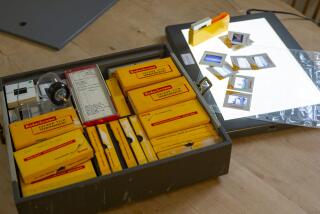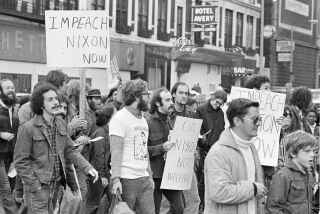Recalling the Good Old Days . . . Sort of
- Share via
T. Willard Hunter of Claremont writes to inform me that the “anonymous” essay on things we didn’t have before 1941 was in fact written by Nardi Reeder Campion, Wellesley ‘38, for the Wellesley alumnae paper on her class’s 45th reunion in 1983. It was called “The Class of 1938 B.C. (Before Computers).”
Irvin Borders of San Diego not only names Campion as the author but reminds me that I have quoted it before and that I wrote of meeting Campion at my home when she was in Los Angeles.
I am indeed embarrassed. One thing I had before 1938 was a good memory. I have just telephoned Campion at her home in Hanover, N.H., to apologize, and found her in good health and as sharp as ever.
Hunter notes that “the piece has been reproduced in countless alumni magazines and has been quoted at a thousand Rotary clubs. It’s a very clever and durable piece.”
Borders says: “Hundreds of versions have been circulated without credit or with dozens of pirates claiming authorship; none as good. But you should credit her. Most of your quotes were accurate.”
*
A few readers have complained that some of the items Campion mentions as not having existed in the 1930s actually did. For example, pizza.
Fred A. Glienna writes that “pizza, of course, has been around for centuries.”
“We discovered pizza at an early age,” writes Bob Graham of Laguna Hills, “somewhat to the consternation of our Anglo-Saxon parents. Who could forget the sight of the baker in the pizzeria window spinning and tossing the dough into air as he created the thin, crisp crust of the true pizza?”
Well, OK, they didn’t have pizza at Wellesley. I ate my first pizza after World War II.
Bernard S. Krause argues that the author was only “autobiographically correct” in saying that we didn’t have FM radio. I take that to mean we didn’t have it in her experience. Mine either. Krause said FM had moved out of the experimental stage in 1941 and he worked in it.
Sonya and Roger Wing say we did have plastic in the form of Bakelite (a not-very-plastic substance). Also, they say, we had drip-dry clothes (sateen) and day-care centers.
Campion noted some social changes she and her classmates predated: “In 1938 American schools were not desegregated; blacks were not allowed to play in the major leagues; the Daughters of the American Revolution would not let Marian Anderson sing in Constitution Hall; in 1938 ‘Made in Japan’ meant junk; and the term ‘making out’ referred to how you did on an exam.”
Campion also lists some of the things they did have in 1938, but not today: “We had girdles with garters on them and petticoats and serge bloomers for gym.” She recalls that nude posture pictures were required for gym, and that the Harvard men tried to get their hands on them. I don’t remember ever seeing a nude posture picture and I certainly never got my hands on one.
Campion also lists some of the things we do have now, but which she doesn’t especially enjoy. “I don’t go in for consciousness raising or sensitivity training. I don’t like to jog. I don’t like pesto sauce. I don’t know how to pump my own gas. My legs are white and my stockings are brown when the opposite is the style. I’m not into veggies or yoga or Zen or punk. My idea of a good time is to walk with a man, not jog with a Walkman. I seek silence in a day when silence is as rare as a Gutenberg Bible. The man I live with is my husband, and after 42 years he’s still the same one . . . how embarrassing.”
*
It seems incredible that we could have imagined ourselves happy in those days, without so many of today’s conveniences. But Berkeley Hoffman observes that today is not so blissful, either.
He points out that in the late 1930s and ‘40s, a three-bedroom house cost $10,000. (We paid $8,525 for ours in 1950.) His 1949 Ford station wagon “with real wood sides” cost less than $3,000. Food costs have risen from $30 a month to $300, he says, and the food is not as fresh and is less healthful. He says salaries today, although higher, are not high enough to compensate for the inflation.
“Today we have the ‘pleasure’ of pollution, smog, toxic waste, drugs, AIDS, gang killings, rude drivers, motion pictures with sex and violence and bad language. Music used to be Glenn Miller, Mancini, Goodman, Crosby, Sinatra, Gershwin, Kern and a few hundred more. There is no music today, just noise.”
I don’t know. I used to like Benny Goodman, and he was noisy.
Also, radio music isn’t all bad. The other night my wife and I heard Gaetano Donizetti’s L’elisir d’amore on KKGO. It was glorious.
But I wish I’d gone to Wellesley. It must have been fun.
* Jack Smith’s column is published Mondays.


